Pilgrim Congregational Church / All Pilgrims Christian Church
509 Tenth Avenue E.
Seattle, WA
Note: Not playable. (in this location)
Images
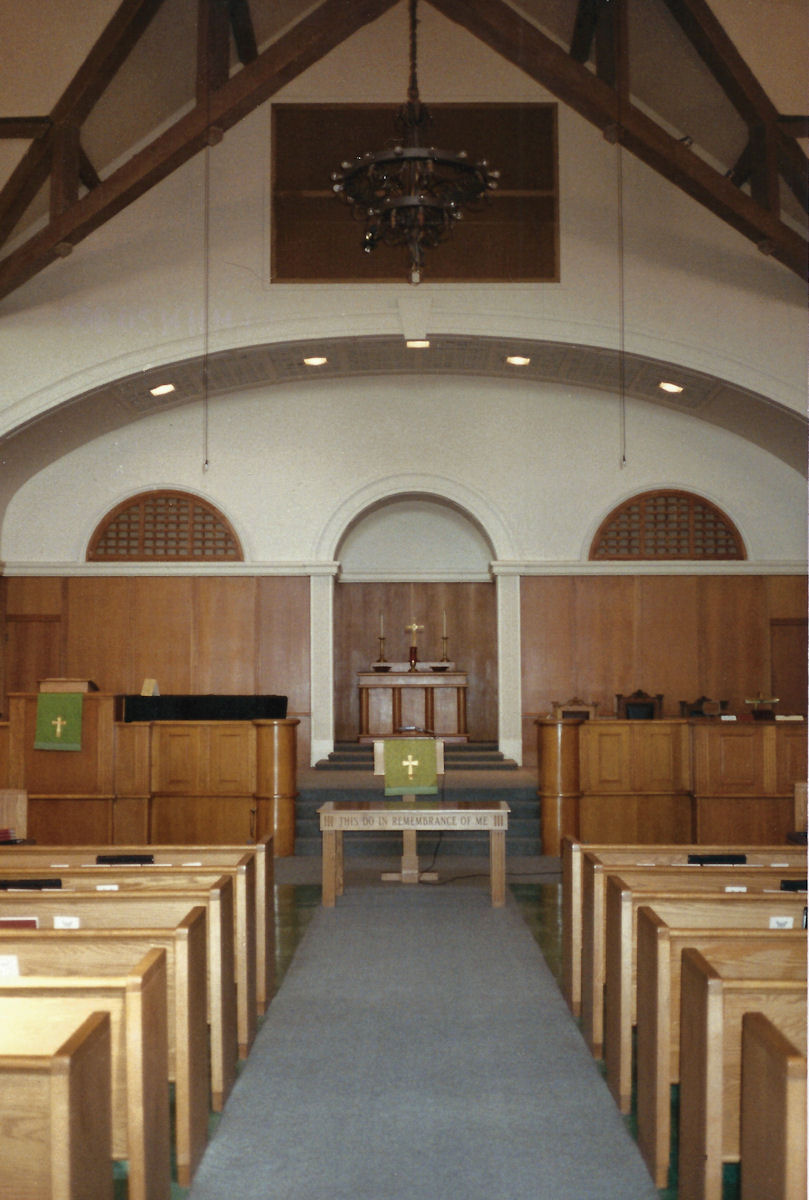 1993-09-02 - Church Interior, Chancel, and Walled-over Grillework (Photograph by James R. Stettner/Database Manager)
1993-09-02 - Church Interior, Chancel, and Walled-over Grillework (Photograph by James R. Stettner/Database Manager)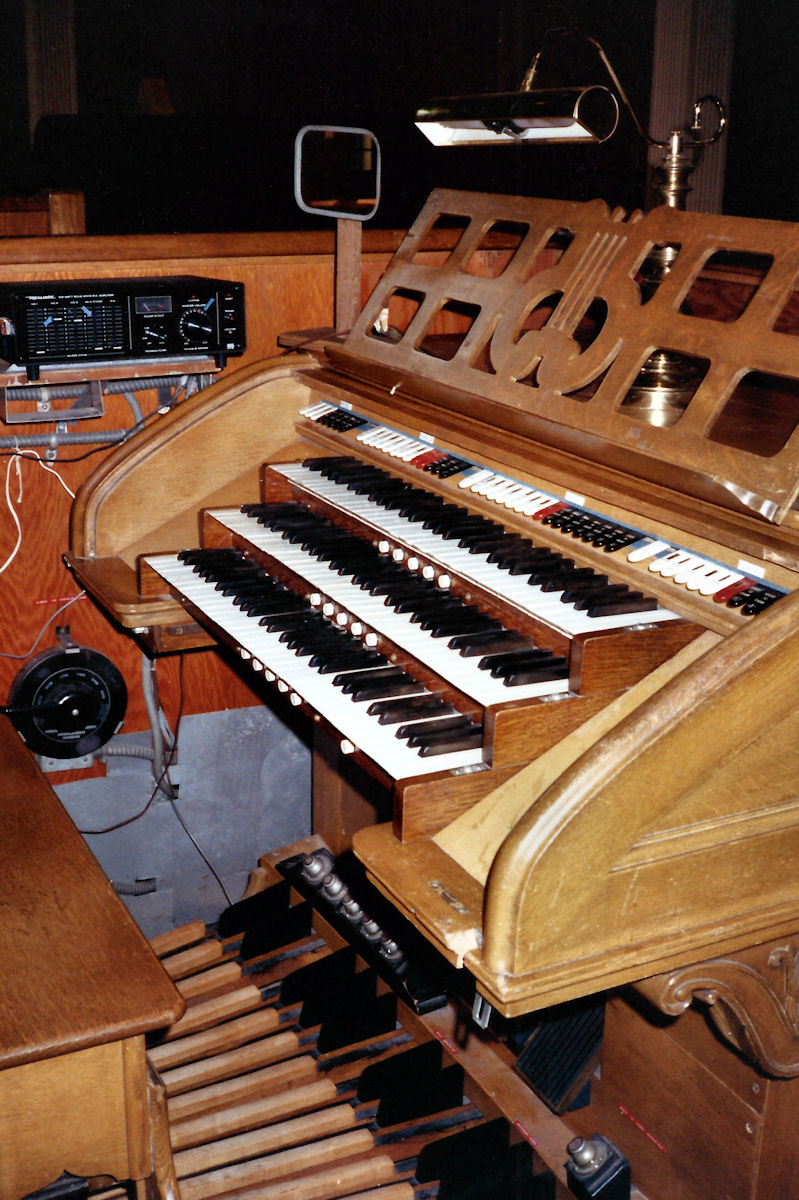 1993-09-02 - Console (Photograph by James R. Stettner/Database Manager)
1993-09-02 - Console (Photograph by James R. Stettner/Database Manager)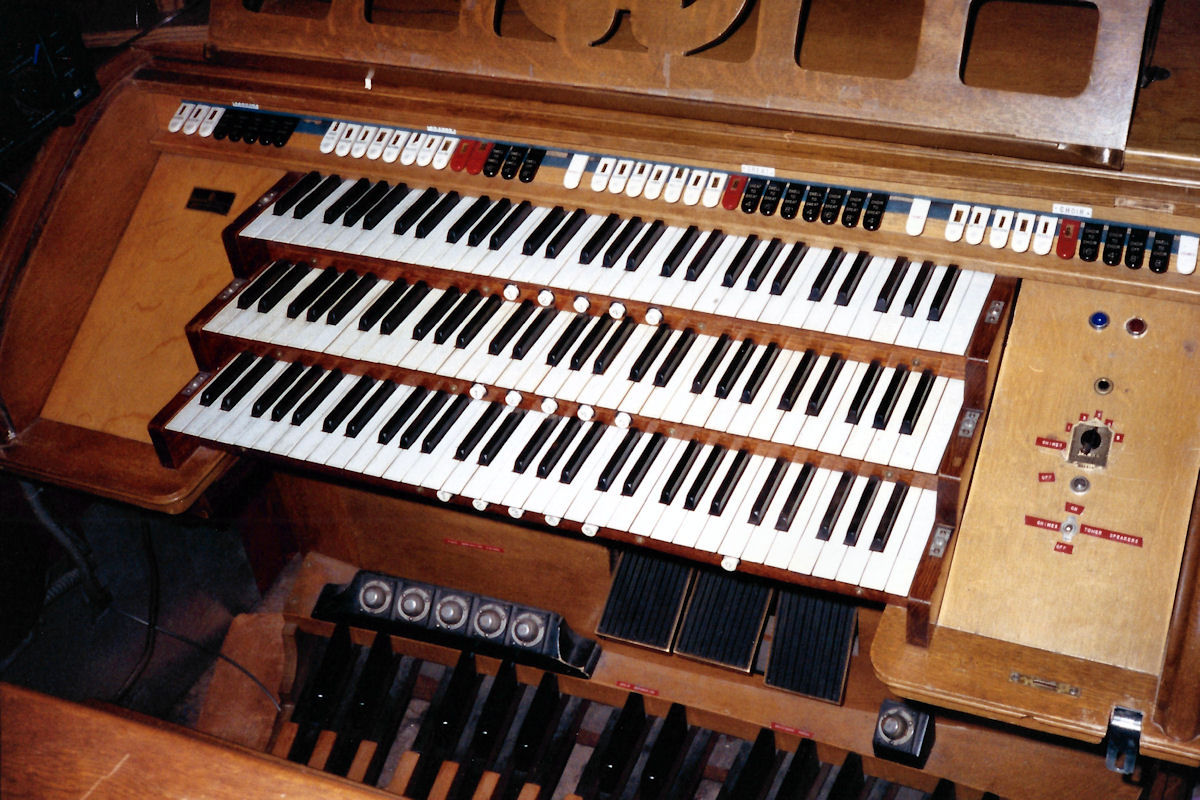 1993-09-02 - Console (Photograph by James R. Stettner/Database Manager)
1993-09-02 - Console (Photograph by James R. Stettner/Database Manager)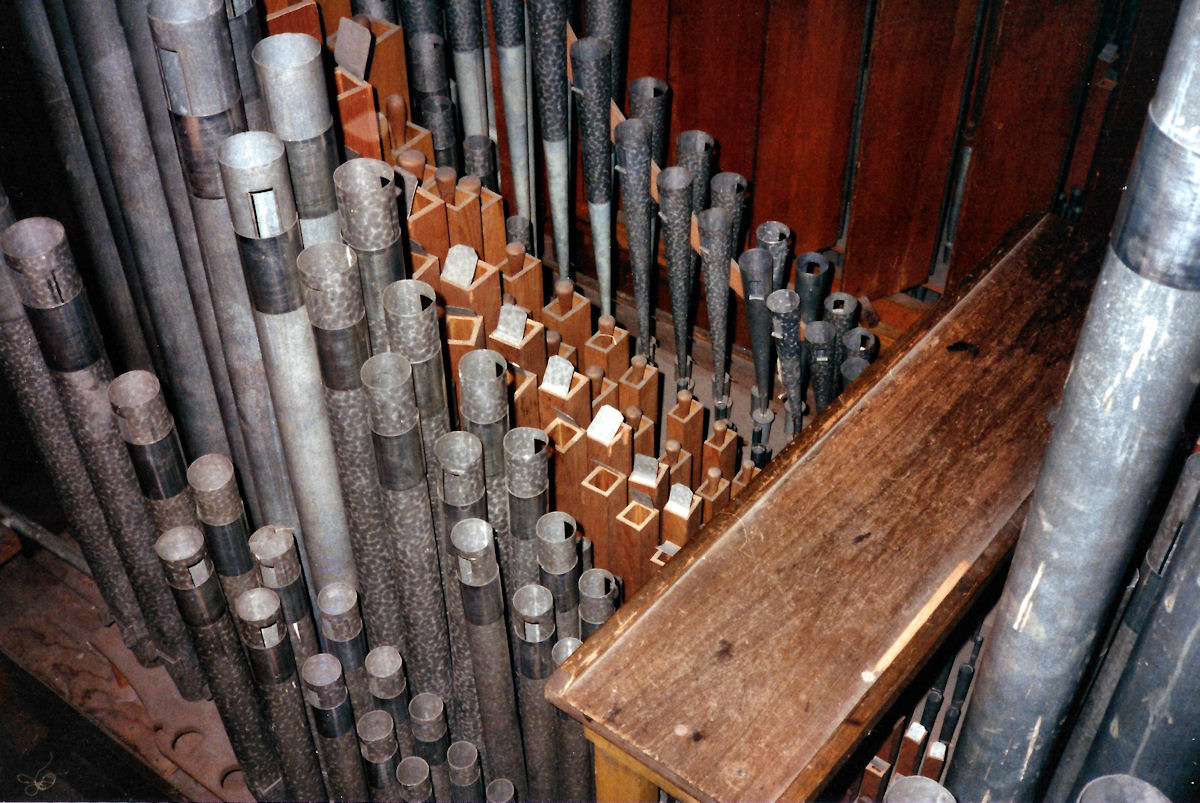 1993-09-02 - Great Pipework ((front-to-back): 16' Open Diapason, 8' Open Diapason, 8' Gamba, 8' Clarabella, 8' Doppel Flute, 4' Octave, 2' Fifteenth, 8' Trum/Database Manager)
1993-09-02 - Great Pipework ((front-to-back): 16' Open Diapason, 8' Open Diapason, 8' Gamba, 8' Clarabella, 8' Doppel Flute, 4' Octave, 2' Fifteenth, 8' Trum/Database Manager)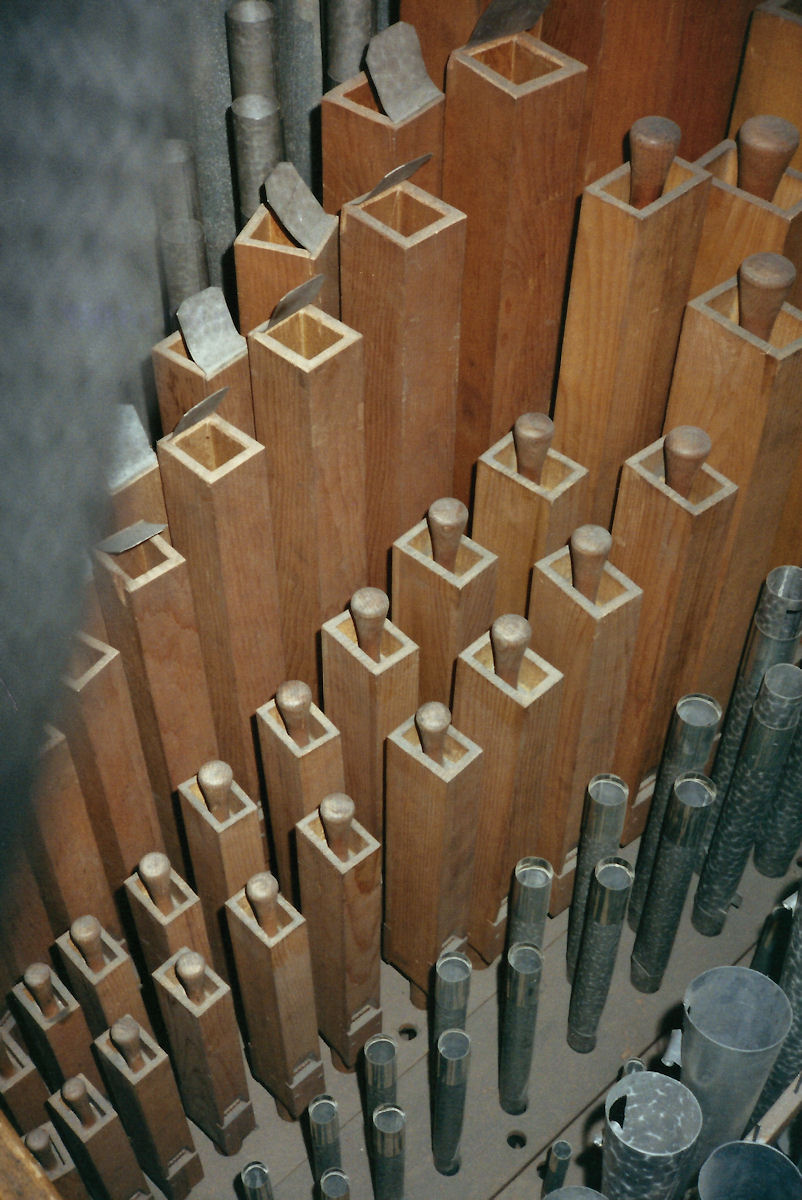 1993-09-02 - Great Pipework ((front-to-back): 8' Trumpet, 2' Fifteenth, 4' Octave, 8' Doppel Flute, 8' Clarabella, 8' Gamba. Photograph by James R. Stettner/Database Manager)
1993-09-02 - Great Pipework ((front-to-back): 8' Trumpet, 2' Fifteenth, 4' Octave, 8' Doppel Flute, 8' Clarabella, 8' Gamba. Photograph by James R. Stettner/Database Manager)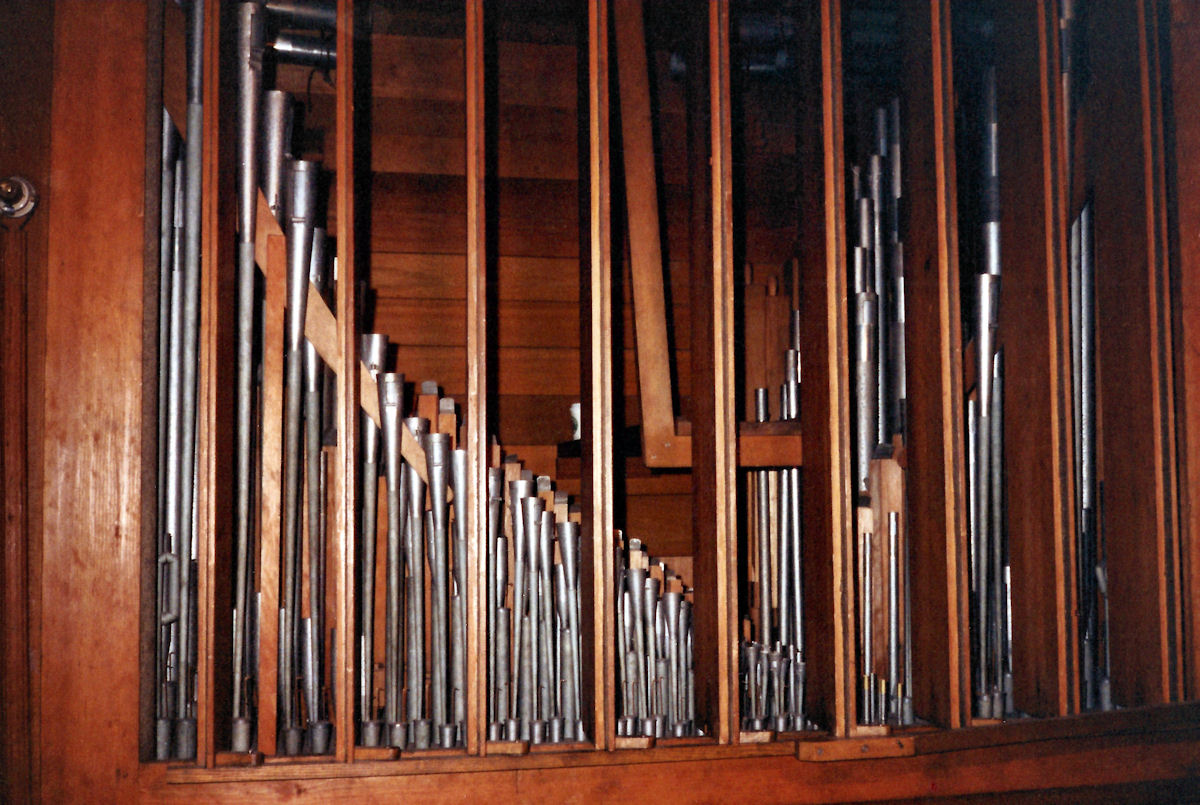 1993-09-02 - Swell Pipework ((8' Vox Humana and 8' Oboe in front) Photograph by James R. Stettner/Database Manager)
1993-09-02 - Swell Pipework ((8' Vox Humana and 8' Oboe in front) Photograph by James R. Stettner/Database Manager)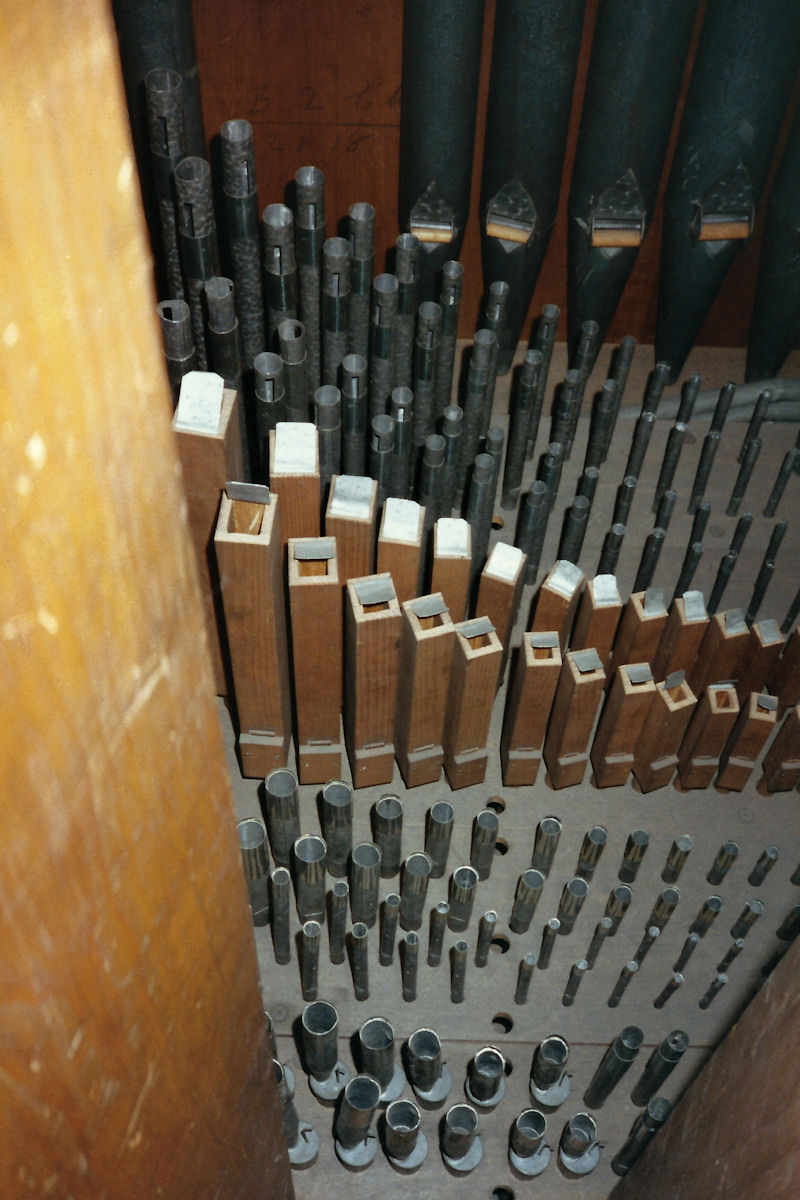 1993-09-02 - Choir Pipework ((front-to-back): 8' Clarinet, 2' Hamonic Piccolo, 4' Flute d'Amour, 8' Melodia, 8' Dulciana, 8' Geigen Principal. Photograph by/Database Manager)
1993-09-02 - Choir Pipework ((front-to-back): 8' Clarinet, 2' Hamonic Piccolo, 4' Flute d'Amour, 8' Melodia, 8' Dulciana, 8' Geigen Principal. Photograph by/Database Manager)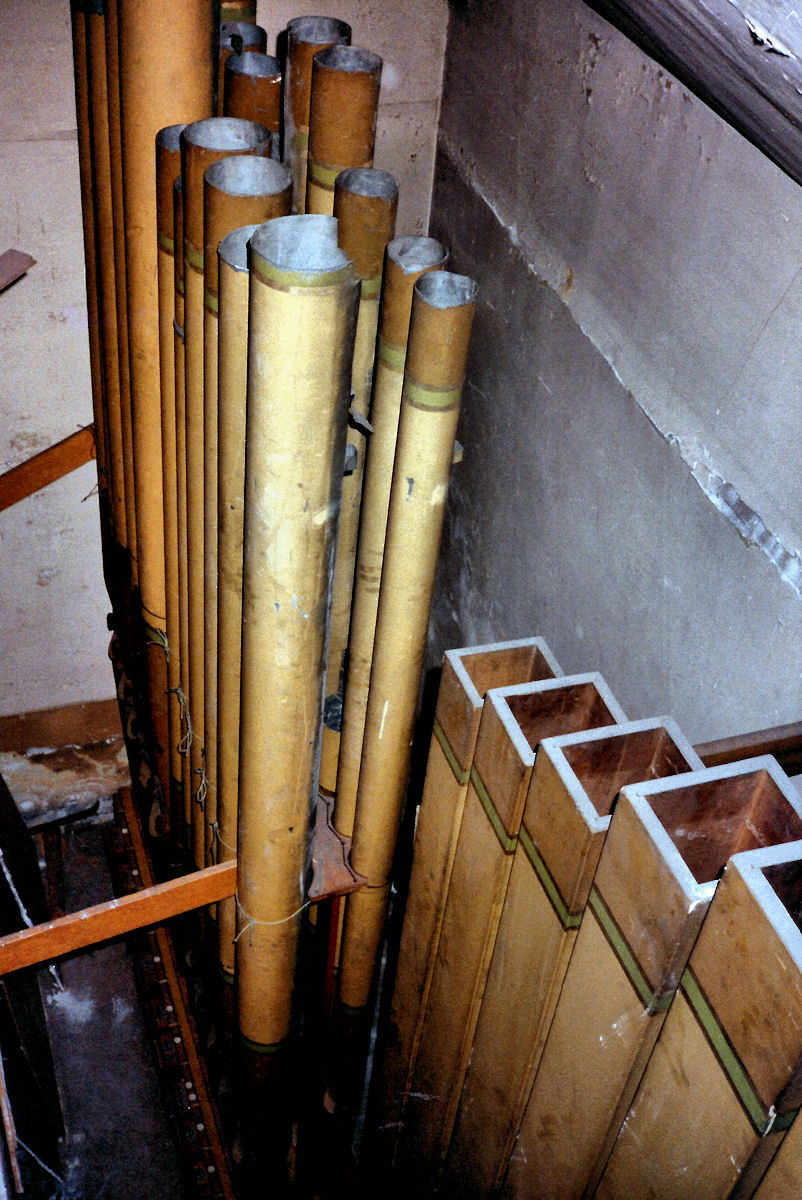 1993-09-02 - Offset Original Facade Pipes (Photograph by James R. Stettner/Database Manager)
1993-09-02 - Offset Original Facade Pipes (Photograph by James R. Stettner/Database Manager)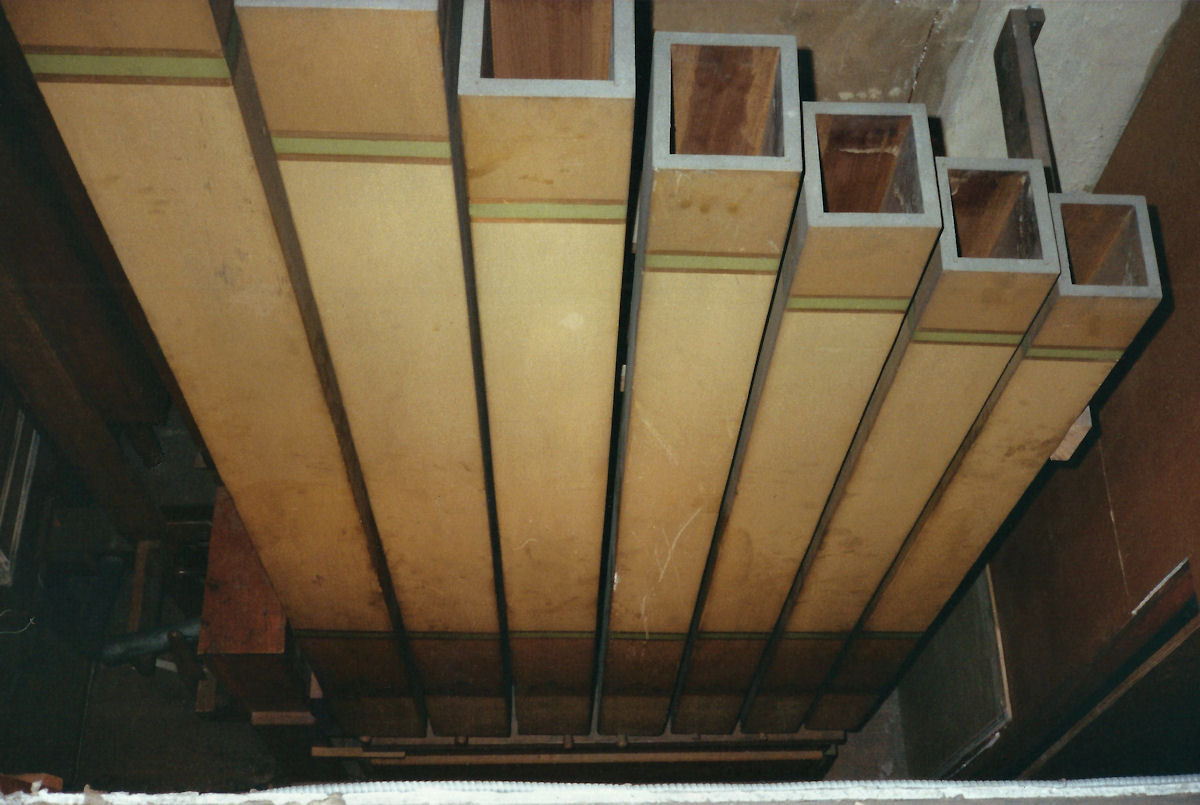 1993-09-02 - Pedal Pipework ((16' Double Open Diapason) Photograph by James R. Stettner/Database Manager)
1993-09-02 - Pedal Pipework ((16' Double Open Diapason) Photograph by James R. Stettner/Database Manager)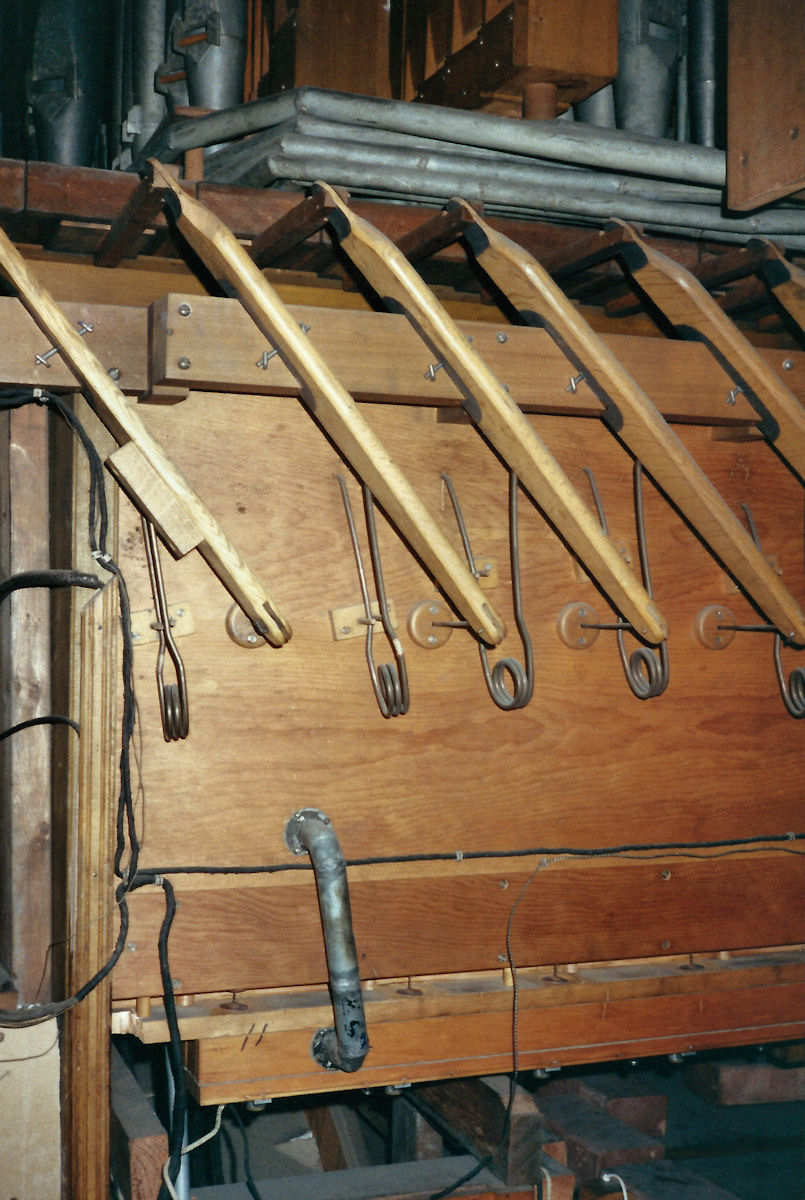 1993-09-02 - Great Slider Chest Stop Action (Photograph by James R. Stettner/Database Manager)
1993-09-02 - Great Slider Chest Stop Action (Photograph by James R. Stettner/Database Manager)
Consoles
Main
- Organ type: Traditional With Roll Top
- Console position: Console in Fixed Position, Right
- 3 manuals
- 27 stops
- 28 registers
- 4 divisions
- Key action Type: Electrical
- Stop action Type: Electrical
- Stop layout Type: Stop Keys Above Top Manual
- Manual compass: 61 notes
- Pedal compass: 30 notes
- Pedal Type: Concave Radiating (Details Unknown)
- Expression Type: Balanced Expression Shoes/Pedals (Details Unknown)
- Combination action: Setterboard
- Has combination thumb pistons
- Has combination toe pistons
- Has coupler toe pistons
Notes
2004-10-30 - Status Note: There 1995. -Database Manager
2004-10-30 - To be refurbished (by Marceau?). -Database Manager
2007-02-12 - Updated through online information from Ryan Dye. -- Church is now called All Pilgrims Christian Church as Pilgrim Congregational UCC and Seattle First Christian DOC merged in 2003.. The original stenciled facade was visible above the altar in the front of the room. The original Hook console was also above the altar near the façade. It was a standard terraced draw-knob console. Unfortunately in the 1940s, Balcolm & Vaughan rebuilt the console and tore out the draw knobs and replaced them with plastic tabs from some theatre organ. They also walled over the pipes, leaving only a small opening under a newly constructed arch. The pedal façade pipes were moved to a new chest on the far left hand side of the church behind the new arched façade. The organ was electrified from tubular-pneumatic and the console was moved down to the main floor. I became Music Director in 2000 and the orginal Hook console had since failed and was replaced by an Estey or Kimball console put in by René Marceau. That console began to fail soon after I arrived. The organ is no longer playable. The original console is sitting in the chapel. The organ is awaiting a complete restoration...and the removal of the dreaded arch. The church currently uses an electronic organ installed in 2003. -Database Manager
2007-05-07 - Updated through online information from James R. Stettner. -- This is Seattle's oldest organ in its original home. Other than the electrification, it is entirely original and intact. It is, indeed, sad that it was electrified. But the church bears some culpability in this...not just Balcom and Vaughan. They allowed it to happen, and may have requested it since the console and choir were in a front gallery. The stop tablets that were added to the console were NOT used theatre organ tablets. The nomenclatures are too close to the writing on the pipes to have been random used tablets. They appear to be standard 1940s Durst & Co. stop tablets from whom Balcom and Vaughan is known to have regularly ordered pipes and supplies. The registers/stops/ranks/pipes listed above reflect the organ as Balcom and Vaughan electrified it, and as documented on Sept. 2, 1993. This does not include stopkeys controlling couplers, but does include the chimes. The Hook & Hastings opus list gives the size as 39 registers. -Database Manager
2007-05-08 - Updated through online information from James R. Stettner. -- The used console that was added to the organ by Rene Marceau was a 1940s vintage Kimball console which was added to the three-manual Estey (Op. 763, 1910) at First Presbyterian in Spokane, Washington. That console has since been acquired by the Pipe Organ Foundation of Mercer Island, Washington; it was rebuilt and retro-fitted with Syndyne solid state, and now controls the organ at Mercer Island Presbyterian Church on Mercer Island, Washington. -Database Manager
2014-06-24 - Updated through online information from James R. Stettner. -Database Manager
Stoplist
Stoplist copied from the console September 2, 1993 Source: Source not recorded Date not recorded
Seattle, Washington
Pilgrim Congregational Church / All Pilgrims Christian Church
HOOK & HASTINGS, Opus 2118, 1906
Balcom and Vaughan, Opus 433, 1946 - Electrification
GREAT SWELL (Expressive)
16 Diapason 61 16 Bass Flute 61
8 Diapason 61 8 Diapason 61
8 Doppel Flute 61 8 Gedeckt 61
8 Clarabella 61 8 Viola 61
8 Gamba 61 8 Salicional 61
4 Octave 61 8 Voix Celeste (tc) 49
2 Fifteenth 61 4 Flute [Traverso] 61
8 Trumpet 61 4 Violina 61
8 Oboe 61
Great to Great 4' 8 Vox Humana 61
Tremolo
CHOIR (Expressive) Swell to Swell 16'
8 Diapason 61 Swell Off 8'
8 Melodia 61 Swell to Swell 4'
8 Dulciana 61
4 Flute [d'Amour] 61
2 Piccolo 61 PEDAL
8 Clarinet 61 16 Diapason [wood] 30
Chimes (Maas; TA – f 42) (21) 16 Bourdon 30
8 Cello 30
Choir to Choir 16'
Choir Off 8'
Choir to Choir 4'
COUPLERS FINGER PISTONS
Swell to Pedal 8,4 Swell 1 – 5
Great to Pedal 8,4 Great 1 – 5
Choir to Pedal 8 Choir 1 – 5
0
Swell to Great 16,8,4
Choir to Great 16,8,4
PEDAL MOVEMENTS
Swell to Choir 8 Swell Expression (bal.)
Choir Expression (bal.)
Crescendo (bal.)
TOE STUDS
Pedal 1 – 5
Gt. to Ped. (rev)
ACTION: E-P slider VOICES: 27 STOPS: 28 RANKS: 27 PIPES: 1,542
NOTES
As originally installed, the Hook & Hastings instrument was located in a front choir
gallery. The console was detached and operated slider chests by means of tubular-
pneumatic primary action to open the pallets. The console was a terraced drawknob
console. The visible facade consisted of wood and metal pipes from the Pedal 16'
Diapason; and the Great 16' & 8' Diapasons and 8' Gamba. These 43 stenciled pipes
were arranged in 4 flats separated by 3 towers, and arranged from left-to-right as:
7 – 5 – 7 – 5 – 7 – 5 – 7. The outer flats of 7 pipes each were square wooden pipes
from the Pedal 16' Diapason – notes 14 thru 27. The two towers of 5 pipes each were
from the Great 16' Diapason. The two central flats of 7 pipes each and the center
tower of 5 pipes are from the Great 8' Diapason and 8' Gamba. The stenciling consisted
of a field of chocolate brown at the top and bottom of each pipe with a field of dark
mustard yellow in the center. These were separated by stripes of bright green bordered
with goldleaf bands.
In 1946, the church made a decision to remodel the sanctuary which regrettably included
extensive alterations to the front of the church. The choir gallery in front of the
organ was removed, and the functional facade pipes were removed to offset chests at the
left side of the organ. The primary action was electrified and the console was moved to
a platform on the main sanctuary floor. The front loft was then walled-over, and grilles
in the front wall and ceiling of the chancel platform were installed in a feeble attempt
to provide tonal egress. This has proven to be wholly inadequate. Only the Swell division
speaks out directly towards the front grille. The Great and Choir pipes are below the
opening, and the Pedal pipe mouths are at chamber floor level. This situation has also
restricted access to all parts of the organ for consistent and competent service.
The layout of the organ was Great in front of the Choir on the lower level; and Swell
over the Choir and also over-hanging the Great. The Pedal is divided diatonically on both
sides of the manual divisions.
The console shell is original as are all the manual & pedal chests and all the pipework.
The only new chests in 1946 were those for the displaced facade pipes. The stop action at
the console was also changed from drawknobs in terraced jambs to a single row of tilting
stop tablets over the Swell keys.
The Choir 4' Flute is stopped wood with bored stoppers, and was likely called either Flute
d'Amour or Rohr Flute. The Swell 4' Flute is open wood and harmonic beginning at middle c.
It was likely called Flauto Traverso or Traverse Flute. The first 10 pipes of the Swell 16'
Bass Flute are mounted horizontally against the back wall of the swellbox. Balcom and Vaughan
added two drawers beneath the key bed on either side of the console. These are setterboard
switches for the combination action. The Great and Pedal are in the left drawer, and the
Swell and Choir in the right drawer.
The organ remains an historically significant instrument in Seattle. It is the oldest extant
tonally unaltered original organ in its original home in the city. Excepting the electrifi-
cation of the tubular-pneumatic action, the organ remains mechanically unaltered as well.
Sources: Hook & Hastings opus list; Balcom and Vaughan opus list & files; JRS;
extant organ
[Received from James R. Stettner 2014-06-24.]
Related Pipe Organ Database Entries
Other Links
Regrettably, it is not possible to display the information about the sponsor of this pipeorgandatabase entry or if there is a sponsor. Please see About Sponsors on Pipe Organ Database.









